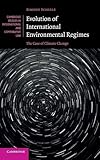Evolution of international environmental regimes : the case of climate change / Simone Schiele.
Series: Cambridge studies in international and comparative law ; 108Publisher: Cambridge, UK : Cambridge University Press, [2014]Publisher: ©2014Description: xviii, 287 pages ; 24 cmContent type:- text
- unmediated
- volume
- 9781107044159 (hardback)
| Item type | Current library | Home library | Collection | Call number | Materials specified | Copy number | Status | Date due | Barcode | |
|---|---|---|---|---|---|---|---|---|---|---|
| AM | PERPUSTAKAAN UNDANG-UNDANG | PERPUSTAKAAN UNDANG-UNDANG KOLEKSI AM-P. UNDANG-UNDANG | - | C39.21.S336 2 (Browse shelf(Opens below)) | 1 | Available | 00002128680 |
Browsing PERPUSTAKAAN UNDANG-UNDANG shelves, Shelving location: KOLEKSI AM-P. UNDANG-UNDANG Close shelf browser (Hides shelf browser)
Includes bibliographical references and index.
Machine generated contents note: 1. Introductory observations and approach; 2. International environmental regimes and their treaties; 3. International climate regime; 4. Effectiveness of international environmental regimes and'creative legal engineering'; 5. International regimes as normative systems; 6. Methodology for determining the norms, sources and underlying theories of international law in the international climate regime; 7. Sources of legal norms in the international climate regime and the negotiations leading up to and at the Copenhagen conference; 8. Sources of legal norms in the international climate regime and Compliance Committee methods of interpretation; 9. Increasing robustness of the international climate regime as a system of norms; 10. Conclusions.
'Drawing specifically on the international climate regime, Simone Schiele examines international environmental regimes from a legal perspective and analyses a core feature of international regimes - their ability to evolve over time. In particular, she develops a theoretical framework based on general international law which allows for a thorough examination of the understanding of international law and the options for law-creation in international environmental regimes. The analysis therefore provides both a coherent understanding of the international climate regime and a starting point for further research in other regimes'-- Provided by publisher.
There are no comments on this title.







